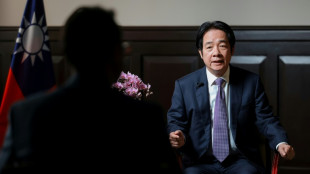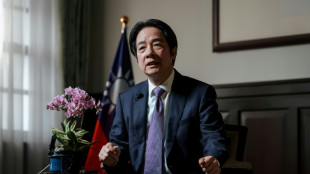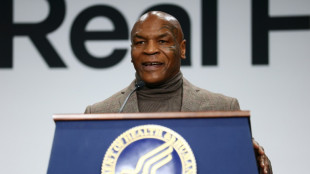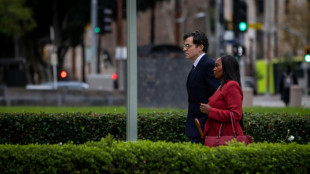
-
 Plenty of peaks, but skiing yet to take off in Central Asia
Plenty of peaks, but skiing yet to take off in Central Asia
-
UN aid relief a potential opening for Trump-Kim talks, say analysts

-
 Berlin Film Festival to open with a rallying cry 'to defend artistic freedom'
Berlin Film Festival to open with a rallying cry 'to defend artistic freedom'
-
Taiwan leader wants greater defence cooperation with Europe: AFP interview

-
 Taiwan leader warns countries in region 'next' in case of China attack: AFP interview
Taiwan leader warns countries in region 'next' in case of China attack: AFP interview
-
World Cup ticket prices skyrocket on FIFA re-sale site

-
 'No one to back us': Arab bus drivers in Israel grapple with racist attacks
'No one to back us': Arab bus drivers in Israel grapple with racist attacks
-
Venezuelan AG wants amnesty for toppled leader Maduro

-
 Scrutiny over US claim that Mexican drone invasion prompted airport closure
Scrutiny over US claim that Mexican drone invasion prompted airport closure
-
Trump to undo legal basis for US climate rules

-
 Protesters, police clash at protest over Milei labor reform
Protesters, police clash at protest over Milei labor reform
-
Dyche sacked by Forest after dismal Wolves draw

-
 France seeks probe after diplomat cited in Epstein files
France seeks probe after diplomat cited in Epstein files
-
Rivers among 2026 finalists for Basketball Hall of Fame

-
 Israel president says antisemitism in Australia 'frightening'
Israel president says antisemitism in Australia 'frightening'
-
Trump orders Pentagon to buy coal-fired electricity

-
 Slot hails 'unbelievable' Salah after matching Liverpool assist record
Slot hails 'unbelievable' Salah after matching Liverpool assist record
-
Von Allmen joins Olympic ski greats, French couple win remarkable ice dance

-
 Guardiola eyes rest for 'exhausted' City stars
Guardiola eyes rest for 'exhausted' City stars
-
US pushes for 'dramatic increase' in Venezuela oil output

-
 France's Cizeron and Fournier Beaudry snatch Olympic ice dancing gold
France's Cizeron and Fournier Beaudry snatch Olympic ice dancing gold
-
Man City close on Arsenal, Liverpool end Sunderland's unbeaten home run

-
 Van Dijk sinks Sunderland to boost Liverpool's bid for Champions League
Van Dijk sinks Sunderland to boost Liverpool's bid for Champions League
-
Messi out with hamstring strain as Puerto Rico match delayed

-
 Kane helps Bayern past Leipzig into German Cup semis
Kane helps Bayern past Leipzig into German Cup semis
-
Matarazzo's Real Sociedad beat Athletic in Copa semi first leg

-
 Arsenal stroll in Women's Champions League play-offs
Arsenal stroll in Women's Champions League play-offs
-
Milei labor law reforms spark clashes in Buenos Aires

-
 Bangladesh's political crossroads: an election guide
Bangladesh's political crossroads: an election guide
-
Bangladesh votes in landmark polls after deadly uprising

-
 US stocks move sideways after January job growth tops estimates
US stocks move sideways after January job growth tops estimates
-
Man City close in on Arsenal with Fulham cruise

-
 Mike Tyson, healthy eating advocate for Trump administration
Mike Tyson, healthy eating advocate for Trump administration
-
LA 2028 Olympics backs chief Wasserman amid Epstein uproar

-
 Brighton's Milner equals Premier League appearance record
Brighton's Milner equals Premier League appearance record
-
Seahawks celebrate Super Bowl win with title parade

-
 James Van Der Beek, star of 'Dawson's Creek,' dies at 48
James Van Der Beek, star of 'Dawson's Creek,' dies at 48
-
Scotty James tops Olympic halfpipe qualifiers as he chases elusive gold

-
 Swiatek, Rybakina fight back to reach Qatar Open quarter-finals
Swiatek, Rybakina fight back to reach Qatar Open quarter-finals
-
Trump tells Israel's Netanyahu Iran talks must continue

-
 England to face New Zealand and Costa Rica in pre-World Cup friendlies
England to face New Zealand and Costa Rica in pre-World Cup friendlies
-
'Disgrace to Africa': Students turn on government over Dakar university violence

-
 Simon in credit as controversial biathlete wins Olympic gold
Simon in credit as controversial biathlete wins Olympic gold
-
McIlroy confident ahead of Pebble Beach title defense

-
 US top official in Venezuela for oil talks after leader's ouster
US top official in Venezuela for oil talks after leader's ouster
-
Ukraine will only hold elections after ceasefire, Zelensky says

-
 WHO urges US to share Covid origins intel
WHO urges US to share Covid origins intel
-
TotalEnergies can do without Russian gas: CEO

-
 Instagram CEO denies addiction claims in landmark US trial
Instagram CEO denies addiction claims in landmark US trial
-
Israel's Netanyahu pushes Trump on Iran


EU lawmakers to back world's first AI rules
European Parliament lawmakers will vote Wednesday to kickstart talks to approve the world's first sweeping rules on artificial intelligence systems like ChatGPT, aiming to curb potential harms while nurturing innovation.
Although the EU's plans date back to 2021, the draft rules took on greater urgency when ChatGPT exploded onto the scene last year, showing off AI's dizzying development and the possible risks.
There is also growing clamour to regulate AI across the Atlantic, as pressure grows on Western governments to act fast in what some describe as a battle to protect humanity.
While AI proponents hail the technology for how it will transform society, including work, healthcare and creative pursuits, others are terrified by its potential to undermine democracy.
Once adopted by the EU parliament, officials say negotiations for a final law with the bloc's 27 member states will begin almost immediately, starting later Wednesday.
The race is on to strike an agreement on final legislation by the end of the year.
Even if that ambitious target is achieved, the law would not come into force until 2026 at the earliest, forcing the EU to push for a voluntary interim pact with tech companies.
Brussels and the United States agreed last month to release a common code of conduct on AI to develop standards among democracies.
Lawmakers have hailed the draft law as "historic" and pushed back against critics who say the EU's plans could harm rather than encourage innovation.
"Is this the right time for Europe to regulate AI? My answer is resolutely yes -- it is the right time because of the profound impact AI has," MEP Dragos Tudorache said during Tuesday's parliamentary debate in Strasbourg.
"What we can do here is to create trust, legal certainty, to enable AI to develop in a positive manner," European Commission Vice President Margrethe Vestager said.
- 'Common' approach -
The law will regulate AI according to the level of risk: the higher the risk to individuals' rights or health, for example, the greater the systems' obligations.
The EU's proposed high-risk list includes AI in critical infrastructure, education, human resources, public order and migration management.
The parliament has added extra conditions before the high-risk classification would be met, including the potential to harm people's health, safety, rights or the environment.
There are also special requirements for generative AI systems -- those such as ChatGPT and DALL-E capable of producing text, images, code, audio and other media -- that include informing users that a machine, not a human, produced the content.
Another MEP spearheading the law in parliament, Brando Benifei, called for a "common approach" to tackle AI risks.
"We need to compare notes with lawmakers all around the world," he said.
Tudorache added that the law was needed "because hoping that companies will self-regulate is not enough to safeguard our citizens".
- Risks versus rights -
Throughout the parliament's scramble to reach an agreement that began last year, rights defenders have urged the EU to protect rights.
Under the parliamentary committee text approved last month, lawmakers propose bans on AU systems that use biometric surveillance, emotion recognition and so-called predictive policing.
But Mher Hakobyan of Amnesty International warned this was at risk because "parliament may upend considerable human rights protections" that were agreed on by parliamentary committees last month.
There are still fears that, even if lawmakers agree on those bans, they may not make it into the final law after negotiations with EU member states.
"There's a real risk that when the state representatives get involved, a lot of these protections could be removed or significantly watered down," Griff Ferris, senior legal and policy officer at the non-governmental group Fair Trials, told AFP.
A.AbuSaada--SF-PST




